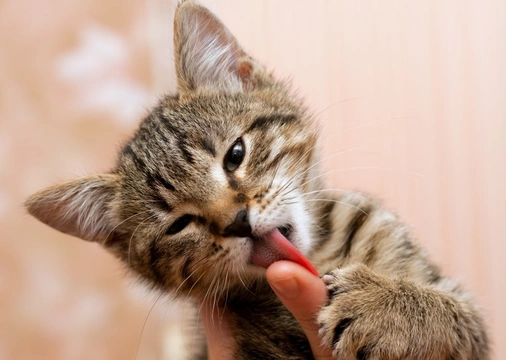Pets
Pets for studWanted petsBreedersAccessories & services
Knowledge hub
Support
Support & safety portal
Why do cats lick people?
While dogs are well-known for being very slobbery and free with their tongues when it comes to licking people to show affection (or find out what that tasty smell on your hands is) cats, on the other hand, do not tend to be thought of in the same way. However, as many cat owners will tell you, their cats do like to lick things-often their favourite people, sometimes bedding or other things, and of course, other cats too.
Being licked by your cat can be an odd sensation, as the tongues of cats are covered in small barbs that face backwards into their mouths, making their tongues feel rather rough and not necessarily comfortable!
In this article, we will look in more detail at why the cat’s tongue is rough, and what it means if they lick you. Read on to learn more.
The cat’s tongue
As mentioned, the tongue of the cat is covered with small barbs that are called papillae, which you might be able to see if your cat yawns slowly or sticks their tongue out! These barbs help cats in a lot of different ways, such as by providing an instant “comb” when they are grooming their fur, to help to remove the last scraps of meat from raw bones, and to help them to hold onto things in their mouths.
However, these barbs can cause some problems too; because they face backwards into the mouth, this means that loose or shed hair that your cat ends up with in their mouths as a result of grooming are swallowed, which can lead to hair balls. They also mean that if your cat gets something stuck in their throat (such as string), they will have a problem spitting it back out as the barbs tend to hang onto it.
These barbs are easy to feel if your cat licks you-but why would your cat lick you (or something else) in the first place? There are a range of different reasons.
To show affection
It is highly unlikely that your cat will lick you if they are not 100% comfortable with you and keen to show you this-licking other cats or people is a form of mutual grooming that cats often indulge in with other cats, or their favourite people. Allowing oneself to be groomed in this way by a cat returns this affection, and lets your cat know that you think of them as yours too.
To infuse you with their scent
All cat owners will be familiar with the phenomenon of stroking their cats and then watching their cat wash and groom themselves thoroughly immediately afterwards-this behaviour is designed to remove the subtle scent of “person” from their coats, and return themselves to their own, usual cat scent.
The same is true if your cat licks you-they are trying to make you smell like them, and so, mark you as theirs.
For comfort
Cats that are hurt, distressed or scared may exhibit a range of different behaviours that we usually associate with happy, contented cats, such as purring-in this context it is known as inappropriate purring, and occurs because the cat is trying to make themselves feel better.
The same can be true of licking, particularly if your cat licks their bedding or blankets-they might just be trying to settle down and get comfortable (or maybe, make something new smell like them) and make their surroundings just so.
To taste something
If you have been sweating and your skin is salty, or if you have been handling food such as meat or tuna, your cat might be attracted to the smell of it on your hands, and lick you to find out more, or to enjoy the taste!
To mark something as theirs
Cats like everything within their territory to be familiar to them, and smell like them too; and so cats will often rub up against new items in the home to infuse it with their scent and mark it as theirs. Sometimes, this extends to licking as well, as part of a concerted effort to take possession of something!
As a mimicry of mother cat behaviour
Mother cats groom their kittens from the time immediately after they are born-initially to stimulate breathing and the digestive system, later on to encourage the kittens to pass waste, and throughout their time with the queen to keep them clean and tidy, and show them how to groom themselves.
Kittens remember this time on some level, and the safe, comfortable feeling of being groomed and cared for by their queen, and so they will sometimes exhibit this same behaviour themselves in later life, as a sign of affection and care for another cat or person.
Cats that get on well can often be seen grooming each other, and this is pleasant and reassuring for both parties.



